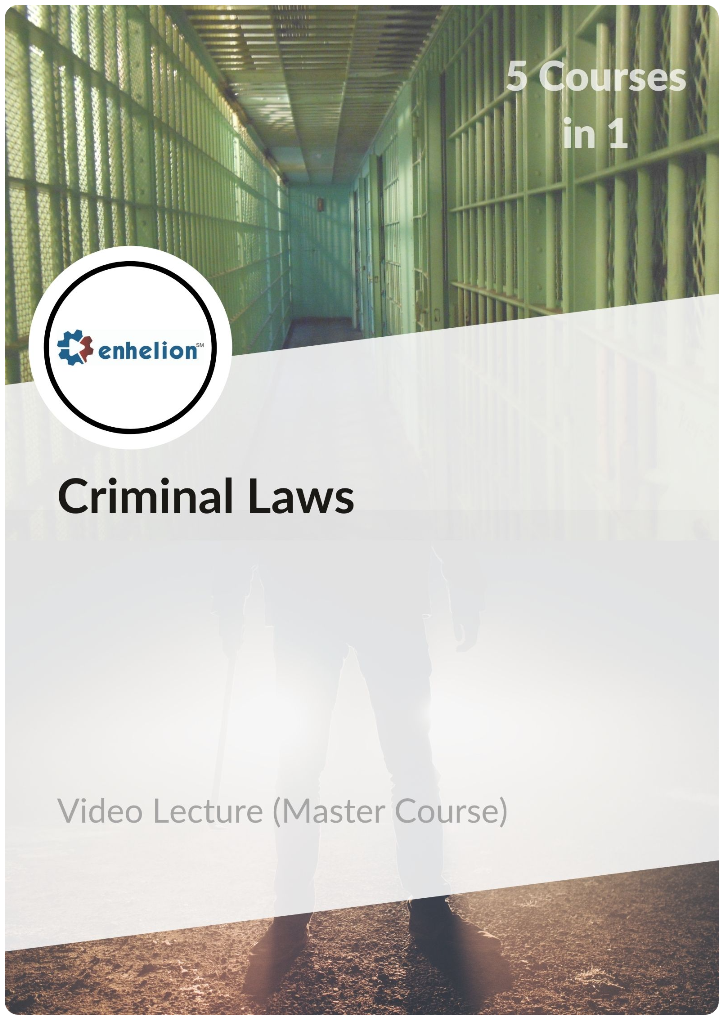Enrol for Lifetime Deal Course and get Access to 80+ Certificate Courses at INR 5999
Enrol for a Master Course at INR 4599 and get access to multiple Certificate Courses
Enrol for a Diploma Course at INR 3599 and get two free Certificate Courses
Enrol for a Certificate Course at INR 2499 and get one free Certificate Course

₹12,997.00 Original price was: ₹12,997.00.₹4,599.00Current price is: ₹4,599.00.
A Master Course consists of a bundle of four to five courses concentrated on a particular field of law. For instance, a Master Course in Criminal Laws consists of courses pertaining to the substantive and procedural aspects of criminal law in India.
A Master Course provides the student access to related courses of a particular field at affordable fees. It is pertinent for anyone who intends to carry out an in-depth study of a specific field.
Master Course in Criminal Laws provides an in-depth understanding of various procedural and substantive aspects of criminal law in India under the Indian Penal Code, the Code of Criminal Procedure and the Indian Evidence Act. It further discusses in detail, various provisions pertaining to prevention of sexual harassment of women at workplace and elaborates upon the legal framework to curb white collar crimes in India.
According to the law firms and our policy, the course fees will not be refunded.
Enrolling for the Master Course will enable you to:
The curriculum has been designed to act as a comprehensive guide on the Indian Penal Code, 1860. It analyses each section, with its core components in detail. It further, elaborates upon the concepts under the Code with the help of illustrations and landmark case laws.
The following modules are covered under the course-
The curriculum provides a detailed analysis the criminal procedure in India. It acts as a conceptual guide for the application of evidence in the criminal law. It further examines various redressal mechanisms like cognizance, trial, powers of the magistrate, judgement etc.
The following are the modules which are covered under the course-
The curriculum has been designed to act as a comprehensive guide on the Indian Evidence Act, 1872. It analyses each section, with its core components in detail. It further elaborates upon the concepts under the Act with the help of illustrations and landmark case laws. It discusses in detail, major amendments with respect to electronic evidence.
The following modules are covered under the course-
The curriculum is designed to provide an extensive understanding on white collar crimes and the existing mechanism to deal with them. It discusses in detail, various legislations which were enacted to curb the ever increasing white collar crimes and financial frauds being committed in India.
The following modules are covered under the course-
The curriculum has been designed to act as a conceptual guide on the legislation pertaining to prevention of sexual harassment at the workplace. It discusses in detail, the provisions relating to personal conduct in an Organization as well as investigation of complaints of sexual harassment.
The following modules are covered under the course-

In every walk of life, the process of evaluation takes place in one form or the other. If the evaluation process is eliminated from human life then perhaps the aim of life may be lost. Being in the same line, Enhelion is committed to evaluate the process of learning through its courses.
The evaluation will be conducted in a two-fold manner. There will be an MCQ test for each course bundled together as a Master course, that would test the basic understanding of the topics covered in the courses. Furthermore, there will be one Project Assignment, which would test the analytical understanding of the same.
The most intriguing aspect of the evaluation process is the time flexibility it affords. You can take the MCQ test and submit the project assignment as per your convenience.
To be eligible to receive a certificate after successful completion of the course, one is required to secure a minimum of 40 percent overall.

Search Courses